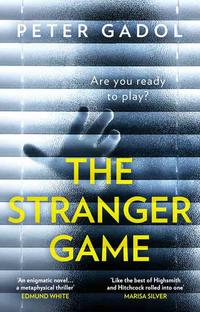
The Stranger Game
I thought the stranger game might be akin to getting lost in a landscape you didn’t know and then finding your way back from its littoral edge, that this was the appeal to Ezra, except he hadn’t come back from this drive, had he? Be with me now. I wanted to understand what he was experiencing. I was convinced he’d become a player, and I admit it made no sense, but I thought the only way to find him was to figure out where the game might lead.
Days after following the two men at the museum, I was looking for new clothes to wear for client presentations, and I ended up randomly tracking a woman my age into the men’s section of a department store. She was checking out sweaters—for whom? A friend, a boyfriend, her husband? Her ex-husband? I watched her set aside several sweaters, all of them gray. Then she stood in front of a full-length mirror and tried on each one. Were they for her? Or was it indeed a holiday gift, but a major consideration was how it would fit her when she borrowed it on cool mornings after she’d spent the night? She’d look ridiculous apparently: she put on a cardigan that looked more like a robe on her. The charcoal turtleneck she ended up purchasing became a minidress, but she didn’t care. She’d be closer to him when she wore it.
Early the following morning instead of driving to the gym, I followed a guy delivering newspapers. He had terrible aim. He slung half the papers at garage doors and light posts and had to hop out of his car to redirect the papers to stoops and gates. This was his third job, he was trying to pick up extra cash to support the little girl in the back seat, belted in next to the steep pile of newsprint. He wanted her to be able to take piano lessons. The more papers he delivered, the lower the pile next to his daughter, and the better her view of a neighborhood miles away from the one where they lived.
Later that afternoon, I followed another father into a diner, a father and his son; the kid wore glasses too big for his face and read a paperback while walking. He attacked a shared sundae with less zeal than his father; he wanted to be reading, he wanted to be in his bedroom with the door shut. The longer I watched them from across the diner, the more vivid everything became: the red of the booth glowed in a ruby wash; the boy’s lenses were as clear as new window glass; in the man’s face, the first striations of age appeared right as I stared at him, like cracks emerging in burning firewood. Every edge became sharper, and maybe it was the time of year, the earlier sunsets, the angled light. Or I was in the habit of observing others with greater care. I’m trying to define a state of hyperalertness. It was a tonic. I wanted to prolong it.
Конец ознакомительного фрагмента.
Текст предоставлен ООО «ЛитРес».
Прочитайте эту книгу целиком, купив полную легальную версию на ЛитРес.
Безопасно оплатить книгу можно банковской картой Visa, MasterCard, Maestro, со счета мобильного телефона, с платежного терминала, в салоне МТС или Связной, через PayPal, WebMoney, Яндекс.Деньги, QIWI Кошелек, бонусными картами или другим удобным Вам способом.
Вы ознакомились с фрагментом книги.
Для бесплатного чтения открыта только часть текста.
Приобретайте полный текст книги у нашего партнера:
Всего 10 форматов